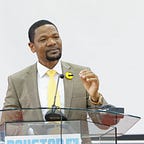ClimatePreneurship with Dr. Richard Munang — Issue #3
Climate Change is already with us. Consequently, it can be easy for people to fall victim to doomism: so overwhelmed by despair that they feel they should give up. But we cannot let that happen. Apathy and inaction, induced by the false belief that an impending apocalypse is inevitable, are just as dangerous as science denial. And we cannot forget that there is a reason for hope! We all need to understand that the world can change for the better and that despite the destruction, as long as there’s are people leveraging on their passions to turn challenges into opportunities, we can make a difference!
We, therefore, need a new perspective. One critical aspect that remains missing in discussions on climate change is human capital, which is the sovereign capital urgently needed for #ClimateAction #NDCs implementation. That is the perspective we urgently need. You cannot address any challenge while ignoring your powerhouse. African #youth are Africa’s powerhouse and how they can become drivers of enterprise opportunities through the climate lens is critical in increasing implementation ambition. We have developed an incubation approach called #InnovativeVolunteerism; we are structurally guiding and inspiring will young people of different backgrounds to turn their passion into profits and retool their skills in developing and decentralizing climate action solutions to address on-demand areas among communities. From turning waste to #cleanenergy fuel #briquettes and # biofertilizers to simple climate action solutions of #solardryers, the #youth are rolling up their sleeves and making a difference across the continent. They’re inventing new ways to cut carbon emissions and drive transformational climate action solutions in communities, and data from what they do is informing and reforming policies for NDCs implementation. This is the #mindsetchange that InnovativeVolunteerism inspires across the continent and the world. If they can do it, you can do it. Start where you are and with what you have. Always remember that change doesn’t start on a global scale.
We must use our voices to inspire others to take action. We must hold our governments accountable for inactivity to increase climate action ambition. Citizens need to be all-in. We must use our spaces, be it our churches, classrooms, universities, and groups of various sorts, to inspire each other to take action. It must start happening in our cities, churches, villages, schools, and everywhere. As individuals, we must realize we have the urgency to do something, and it starts with us. Engage your communities and start using your heart to discuss important things. Everyone — corporations, investors, and civil society — must play their part because climate challenges will only be solved if we take collective action, agree on a common path, and make each area of necessary focus come to life, checking seasonally on whether we are making adequate progress and taking steps to fill gaps as they appear along the way.
Food on the table is not just an environmental issue. The health of your children will be affected by climate change. If we don’t act now, security, economic aspects, and everything you can think of are in jeopardy. Be the one who can start moving the needle and become the pressure point to push action from your community. The youth have become the pressure points, and they are doing what they can to use what they have as they leverage the spirit of innovative volunteerism. Getting trapped in despair and anxiety because of inaction will only make us helpless. The most significant antidote to helplessness is action, and that action starts with you and me. We urgently need active and rational action as that is what inspires hope. As we all move to act and hold our governments to act, the following are some levers to strengthen implementation.
First, prioritise turning NDC commitments into investment tools.
While Africa is a leader in NDCs ratification with a 98% rate, over 70% of African countries have not converted their NDCs into investments that demonstrate a clear return on investment. For example, few countries have expressed a costed expectation of finance from the private sector. This is just the first natural step to attracting market implementation resources that are more sustainable. Countries should, therefore, clearly elucidate the projected return on investment for individuals or institutions who invests in actions that drive the NDCs priorities of governments.
Second, incentivise youth and the informal sector as critical drivers of NDCs implementation.
In Africa, up to 80% of labour is engaged in the informal sector. Over 60% of the population is youthful. The key is how this critical constituency can be tapped to drive NDCs implementation. And for this, targeted fiscal and non-fiscal incentives such as tax holidays for youthful entrepreneurs who engage in actions that implement NDCs will be critical to catalyzing a shift of incentives by these critical groups towards NDC areas.
Third, targeted policy incentives, especially fiscal incentives.
We have favourable fiscal policies across Africa. For example, we have budgetary policies exempting value-added tax on clean cooking, including sustainable fuel briquettes. Affordable financing for the youth engaged in developing the climate action solutions needed by the informal sector, tax holidays to youth entrepreneurs who establish climate action enterprises to enable them to minimize their tax burden during the formative years of their initiatives.
Fourth is non-policy incentives.
Regardless of how timely they may be, policy incentives will accomplish very little if they fall on passionless citizens. This calls for the right mindset- a mindset of discipline, purposeful passion, unborrowed vision, and selflessness. We must never lose sight of the “soft aspects.” We owe ourselves the task of doing so to inspire active and rational hope in others to turn climate change challenges into investment opportunities that work for the many.
“Not everyone who chased the zebra caught it, but he who caught it chased it.” This African proverb is a timely reminder of what we must all do to take our chances to drive the implementation of the NDCs.
